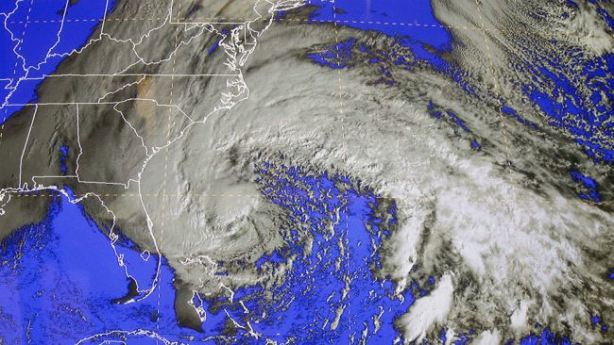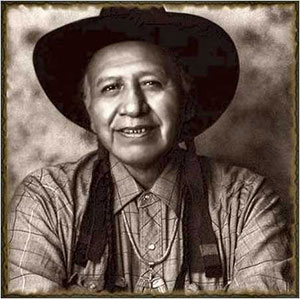Frankenstorm: some rules proposed for prophecy & prediction
Sunday, October 28th, 2012[ by Charles Cameron — some thoughts on news reports and prophecy, since it is not unheard of for people to bolster their versions of prophecy by quoting current events ]
.

AP satellite image - which might as well be titled, in Shelley's words, "look on my works, ye mighty, and despair"
I want to explore the relation of prophecy and prediction to news, and my inbox in the last couple of days has provided me with a simple way to compare and contrast the two.
Here, then, are two versions of what might shortly come to pass:
The upper panel offers a snippet from the Washington Post‘s piece today — in other words, the news. The lower panel offers the headline from an overtly scripture-driven source — in other words, prophecy.
The Joel Rosenberg piece providing an interpretation of what might be just a day away, under that alarming headline, begins:
“For thus says the Lord of hosts, ‘Once more in a little while, I am going to shake the heavens and the earth, the sea also and the dry land. I will shake all the nations.” (Haggai 2:6-7) Just days before one of the most significant and momentous presidential and Congressional elections in American history, God is reminding us that America’s fate lies not in the hands of the politicians, but in His hands. Weather experts are warning Americans on the East Coast to “get ready, be prepared” for Hurricane Sandy, which they say could prove to be one of the most devastating storms in American history. Is that hype, or is it true? Tens of millions Americans are not taking any chances. They are buying water, food, gasoline and other supplies as the storm moves towards land. I can tell you that my family and I in the Washington, D.C. area are doing the same.
**
The interesting question from my POV is whether it is legitimate to invoke supernatural causes when natural causes could sufficiently account for what is observed to be happening.
There is indeed a major storm system in the offing, and it is indeed as yet uncertain whether it will be devastating, a comparatively minor irritant, or somewhere in between. But the Washington Post appears content to attribute the possibilities to natural forces, whereas Rosenberg prefers an explanation in terms of his views on morality.
Basically, there are two positions here:
If we are shaken, it is because we are sinful. If we are shaken, it is because natural forces are interacting in such a way as to cause devastation on the scale of human interest.
I would argue for a third view:
If we are shaken, it is because we have messed enough with the planet’s intricate homeostases as to drive weather patterns to inhospitable extremes.
**
Here are some rules that the looming Frankenstorm has prompted me to consixder:
One:
Don’t overstate the case: if you want a worst case scenario for warning and planning purposes, clearly mark it as such, and at least sketch the alternative scenarios and an informed guess as to their respective likelihoods.
Two:
If you associate a presumed cause to an expected effect, and when the time comes the effect does not happen, admit that the cause as presumed was flawed within your own system of explanation. In the case of Rosenberg’s storm, should it prove to be less of a shaker than Rosenberg’s headline suggests, this would mean he would admit that God obviously didn’t intend to shake America all that much — either because America is less sinful and more pleasing to God than Rosenberg gives it credit for, or because the threat of the storm caused a sufficient moral awakening to make its actuality unnecessary, or because God is more long-suffering than Rosenberg initially imagined.
Three:
Keep your explanation internally consistent. The storm is, even in Rosenberg’s sense, a meteorological phenomenon — which is why his post carries the AP satellite image of Hurricane Sandy that I put at the top of this post. It is a stretch — biblically permitted, but a stretch nevertheless — to assert a moral cause (such as tolerance of homosexuality) for a meteorological event, particularly if the known meteorological causes would in themselves be sufficient to account for it.
**
And then there’s the most interesting part of all.
Suppose that prophecy isn’t a matter of specific and accurate prediction, but a sketch of possible outcomes, along the lines of “if you carry on like that, you’ll drink yourself into an early grave.” When someone says something like that, they don’t mean the person concerned will find an empty grave and get so drunk as to fall into it — they mean that excessive imbibing, over the long term, puts the imbiber at risk of a variety of distressing ends, fatal car crashes and kidney failure among them.
We have the saying, “pride comes before a fall.” Is that prophecy? It is found in scripture, in Proverbs 16.18:
Pride goeth before destruction, and an haughty spirit before a fall.
Arguably the proud and power-hungry have a tendency to overextend themselves — the Greeks would call it hubris, and see nemesis close on its heels. Is it prophecy, then, or a simple observation of human nature? It certainly seems to fit quite a number of circumstances — to be “fulfilled” on a regular basis.
**
My friend and mentor the shaman Wallace Black Elk emphasized to me that in his Lakota tradition, prophecies were understood as visionary warnings of likely outcomes to be avoided — not as inevitabilities.
**
What I’m getting at here is that as predictions become specific — Edgar Whisenart‘s prediction that the Rapture would occur between September 11 and 13, 1988, or Jose Arguelles proclamation that the harmonic convergence of August 17, 1987 would be the great moment of shift — or are interpreted in specific ways — I linked to a minister preaching that Oprah Winfrey was the Antichrist only yesterday — we may be mistaking a poetic reading of trends for an act of previsioning in detail a predetermined, preordained and predestined future.
From my POV, this would mean that prophetic texts should be read as poetic foreshadowings — “put too much strain on the environment and it will bite back at you” — rather than as matrices into which the events of the day should be shoehorned — back in the days of Nero and Domitian, back in the days of Hitler and Stalin, or today, tomorrow and tomorrow…
In this way, both prophetic and scientific traditions can be appropriately honored.




